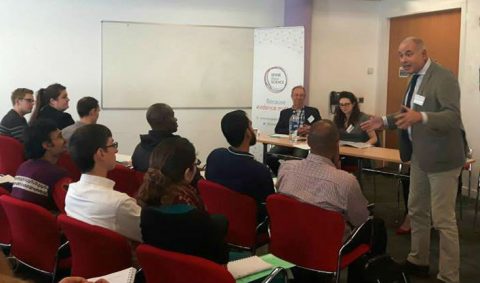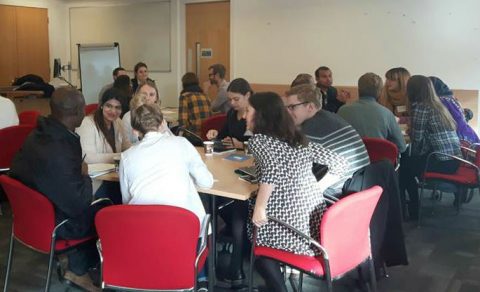The nuts and bolts of peer review
| 18 January, 2017 | Dugald Foster |
|

|

Credit: Sense About Science
Sense About Science, a charity that challenges the misrepresentation of science and evidence in public life, recently organised a workshop, Peer Review: The Nuts and Bolts, to provoke discussion concerning what constitutes good practice in peer review. On 4th November, around 30 early career researchers gathered at Glasgow Caledonian University, and after completing some group work where participants shared their experience of peer review, short presentations were delivered.
Panellists from diverse fields were skilfully moderated by Emily Jesper-Mir of Sense About Science. The academic publishers’ perspective was delivered by Sarah Robbie of Taylor and Francis, who provided insight into the review process, and the channels of communication between reviewers and editors.
Professor Richard Sharpe, Principal Investigator at the MRC Centre for Reproductive Health, and Deputy Editor of the journal Human Reproduction, recommended that early career researchers seek out well-respected academic advisors, and ask for the opportunity to try “practice” reviews of papers they have been sent. Proof of thorough and constructive reviewing can then lead to the development of a good reputation, and review requests from journals in the future.

Sergio Della Sala, Professor of Human Cognitive Neursocience at the University of Edinburgh, and Editor-in-Chief of cognitive science journal Cortex, set the discussion alight in his striking and sincere style. Professor Della Salla suggested that there are different primary focuses for academic publishers (for some, maximising shareholder profit), and working scientists (effectively critiquing and communicating their research) through the peer review process. He also stressed the importance of being aware of how the obsession for “high-profile” and “innovative” publications, as opposed to solid science with transparent methods, can be damaging for young researchers and the quality of science published, as fields become more competitive and less collaborative in the face of limited funding.
Despite this, Professor Della Sala noted that he remains optimistic about peer review when scientific principles are adhered to by authors and reviewers; for this reason, Professors Sharpe and Della Sala agreed that there should be no financial compensation for scientists acting as reviewers, although an ingenious incentive being trialled at Cortex is a “lottery”, in which participating reviewers are entered for a prize draw upon completing a certain number of reviews.
Finally, Joanne Thomas from Sense About Science provided a summary of the work the organisation has done in raising public awareness of peer review, including two public guides I don’t know what to believe and I’ve got nothing to lose by trying it, and explained why peer review can be such an important tool to help the public weigh up claims about science and evidence.

Overall, the take-home message of the workshop was that peer review, although the best solution currently available for maintaining the quality of scientific publications, is far from perfect, and that scientists and reviewers must develop constant vigilance in their work, and a committed adherence to scientific principles in order to maintain the integrity of the system. Even scientifically trained minds are not completely free from unscientific thinking and bias, and recognising this will ensure that peer review develops into a positive and effective tool. Suggestions for concrete improvements to the system have been put forward by practicing scientists, including the development of new ways to quantify reviewer contributions to this important work. In the meantime, debate concerning the most effective method of peer review is likely to continue.

|


User comments must be in English, comprehensible and relevant to the post under discussion. We reserve the right to remove any comments that we consider to be inappropriate, offensive or otherwise in breach of the User Comment Terms and Conditions. Commenters must not use a comment for personal attacks.
Click here to post comment and indicate that you accept the Commenting Terms and Conditions.